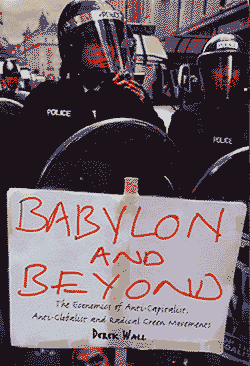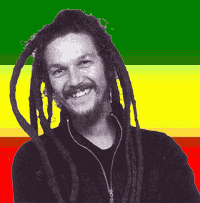 PREFACE
PREFACE
Nandor Tanczos
Human beings face the greatest challenge in the history of our species. We face the
destruction of the life support systems on which our very existence depends, and we face
it because of our own activity.
There are some who deny or diminish that threat. They mostly either retreat into fairy
tale thinking - that technology, or the "free" market, or UFO's will save us - or hope
that by closing their eyes they can it go away.
Yet the evidence is mounting almost daily that the threats are very real and are
gathering momentum. A new report from the UK is saying that if we don't turn carbon
emissions around in the next decade, we will not be able to stop runaway climate change
whatever we do.
Authoritative voices are warning us that we are very close to the point where world
demand for oil will outstrip the capacity of the oilfields to supply. Our total
dependence on fossil fuels, the use of which has provided the energy for an enormous
expansion of human activity and population, is like a chemical addiction. And as the USA
has recently confirmed in Iraq, strip a junkie of their supply and the temptation to turn
to crime can be irresistable.
"The American way of life" says George Bush the First "is not negotiable".
A time of crisis, however, is also the time of greatest opportunity. More and more people
are waking up to the need to change, to change at a fundamental level, and to change
right now. People are waking up to the fact that the institutions of society that so many
have put their trust in are failing us. Government won't do it. Big business can't do it.
Because the challenge we are facing is about more than changing a few policies or
practises. It requires a fundamental rethink of what it means to be a human being.
Government and business can become allies, but the power to make real change lies in the
hearts and the lives of ordinary people.
It is already happening. The international people's movement against genetically
engineered (GE) plants and animals has demonstrated how the reckless agenda of
multinational corporations, aided and abetted by our own governments, can be stopped in
its tracks and rolled back. One conglomerate has been outed bribing government regulatory
officials in Indonesia, GE companies are pulling out of the EU and Australia, and GE
agriculture firms are facing massive stock market losses. The promised gold rush is
proving to be a fantasy, largely because of global consumer resistence.
While the campaign has significant support in the scientific community, for many ordinary
people it began as a sense that something just didn't feel right. That feeling is often
quickly backed up by investigation, but the sense of something being fundamentally
arrogant and wrong about GE is the key - it is our humanness talking to us.
What is it to be human? Western society, at least, defines us as individuals whose value
can be judged by what job we have, what colour credit card, what kind of car we drive and
the label on our clothes.
Yet beneath these displays of status, real people are emotional, social and spiritual
beings - intrinsic characteristics that cannot be considered in isolation from each
other. We seem to have forgotten that our relationships - with one another and all the
other beings with whom we share this beautiful planet - are fundamental to who we are.
There is a passage in the Bible that says
"where there is no vision, the people perish".
The inability to step back and clearly see and understand the "big picture" is the
central problem that we face in the world today. The main motivations for Western
industrial society for the past few hundred years - belief in unlimited growth and
technology as the solution to all problems - are the very things that are killing us.
We cannot grow forever on a finite planet. If we continue to assume that endless growth
and consumption is possible, and disregard the biosphere's capacity to meet our greed,
and if we continue to neglect social justice and fair and sustainable wealth
distribution, we will reap a bitter harvest.
Neither will technology on its own fix the problem. Yes, we need better technology, more
efficient technology that uses non-polluting cyclical processes and that does not depend
on fossil fuels. But just more technology will not do, because the problem is in us and
the way we see ourselves in the world.
We humans think that we can own the planet, as if fleas could own a dog. Our concepts of
property ownership are vastly different from traditional practises of recognising use
rights over various resources. A right to grow or gather food or other resources in a
particular place is about meeting needs. Property ownership is about the ability to live
on one side of the world and speculate on resources on the other, possibly without ever
seeing it, without regard to need or consequence.
The ability to "own" property is fundamental to capitalism. Since the first limited
liability companies - the Dutch and British East India Companies - were formed, we have
seen the kidnapping and enslavement of 20 - 60 million African people and the rape,
murder and exploitation of indigenous people around the world. Colonisation was primarily
about mercantile empires, not political ones. It was all about forcing indigenous,
communitarian people to accept private individual ownership of resources, which could
then be alienated, either by being bought or stolen. The subsequent political
colonisation was just about how to enforce that ownership.
Today property rights are being extended through GATT and TRIPS agreements and through
institutions such as the WTO and the World Bank. Private property rights are being
imposed over public assets such as water, intellectual property and, through genetic
engineering and biopiracy, on DNA sequences. Even traditional healing plants are under
threat. In Aotearoa - New Zealand we have had multinationals attempting to patent piko
piko and other native plants. This is all part of the "free" trade corporate
globalisation agenda - to create tradeable rights over our common wealth, accumulate
ownership and then sell back to us what is already ours.
This is only possible because we have lost our place in the scheme of things. We think of
the environment as something "over there", as something separate from human activity,
something to either be exploited or protected. The reality is that we are as much part of
the environment and the planet as the trees, insects and birds.
It is time to relearn what it means to be human.
Babylon and Beyond, the economics of anti-capatalist, anti-globalist and radical green
movements by Derek Wall. Printed by Pluto Press
And please ask your library to order it!
– Nandor Tanczos
 About Nandor Tanczos
About Nandor Tanczos
Nándor Stephen Tánczos (born 1966), a member of the New Zealand Parliament since 1999, represents the Green Party as a list MP. He briefly lost his seat in the 2005 General Election, but ranked next on the party list and agreed to rejoin Parliament following the sudden death of Rod Donald just prior to the first sitting of Parliament. In 2006, he was an unsuccessful candidate for male co-leader of the Green Party, beaten by non-MP Russel Norman in a STV vote by delegates from electorates around the country at the 2006 AGM.
Wiki: http://en.wikipedia.org/wiki/Nandor_Tanczos.
He has his own website at: http://www.nandor.net.nz
Political - The Green Party
Why the Green Party?
I come from an anarchist background, politically. The idea of being involved in parliamentary politics was a total anathema to me for a long time. But when I was in England I met this guy called Shane Collins, who's a Green over there. I met him through the anti-roads movement where he was involved in direct action. When I went back to London, he was running for Council as a Green Party candidate. That really blew me away. It was the first time I had ever seen anyone combining representative politics with direct action politics. It was the first time I saw you can enter that arena and keep your commitment to grassroots direct action.
When I moved back to Aotearoa, I didn't join the Greens right away because they were a part of the Alliance, which to me represented a very old-school form of left-wing politics. A very patriarchal type of left-wing politics. When the Greens left the Alliance to become an independent Green Party in 1997, I joined that day. Because I felt the Greens were able to articulate a different kind of vision of what politics is and a different vision of what the future of this country and this world could be.
Why be an MP?
People ask me, why be an MP? Isn't Parliament an elite power structure designed to maintain the status quo? Of course, that's why we need to change it. (for more see his website)
Political - Activist Guides (see links on site)
Know Your Rights - One of the problems we face as agents of change is knowing what to do if we get in trouble with the authorities, be they the police, the landlord or at school. On this page you can find many different resources for dealing with different situations. This guide will grow.
NVDA Guide - This is a basic guide to planning a Non Violent Direct Action Campaign for activist groups. It is based on the thought and writing of many different activists. Feedback will be gratefully accepted by Nandor. The guide will grow.
Melbourne S11 - In September 2000, Sue Bradford and I joined the frontline protests at the World Economic Forum in Melbourne. Here is the feature article I wrote about the violence we faced by the police as they broke our blockade.
 About the Author of Babylon & Beyond
About the Author of Babylon & Beyond
Derek Wall is the author of five books including Earth First! and the Anti-Roads Movement (Routledge, 1999) and, with Penny Kemp, A Green Manifesto for the 1990s (Penguin, 1990). He teaches Political Economy at Goldsmiths College, University of London.
He has a Blog at http://another-green-world.blogspot.com:
Another Green World
"How to be green? Many people have asked us this important question. It's really very simple and requires no expert knowledge or complex skills. Here's the answer. Consume less. Share more. Enjoy life." - Penny Kemp and Derek Wall
This blog by Derek Wall, a member of the Green Party since 1980 (Ecology Party then!), promotes anti-capitalism, green politics, direct action, practical lifestyle change, Venezuela/Cuba and a touch of Zen. Ecosocialism or muerte!

 PREFACE
PREFACE About Nandor Tanczos
About Nandor Tanczos
 About the Author of Babylon & Beyond
About the Author of Babylon & Beyond
